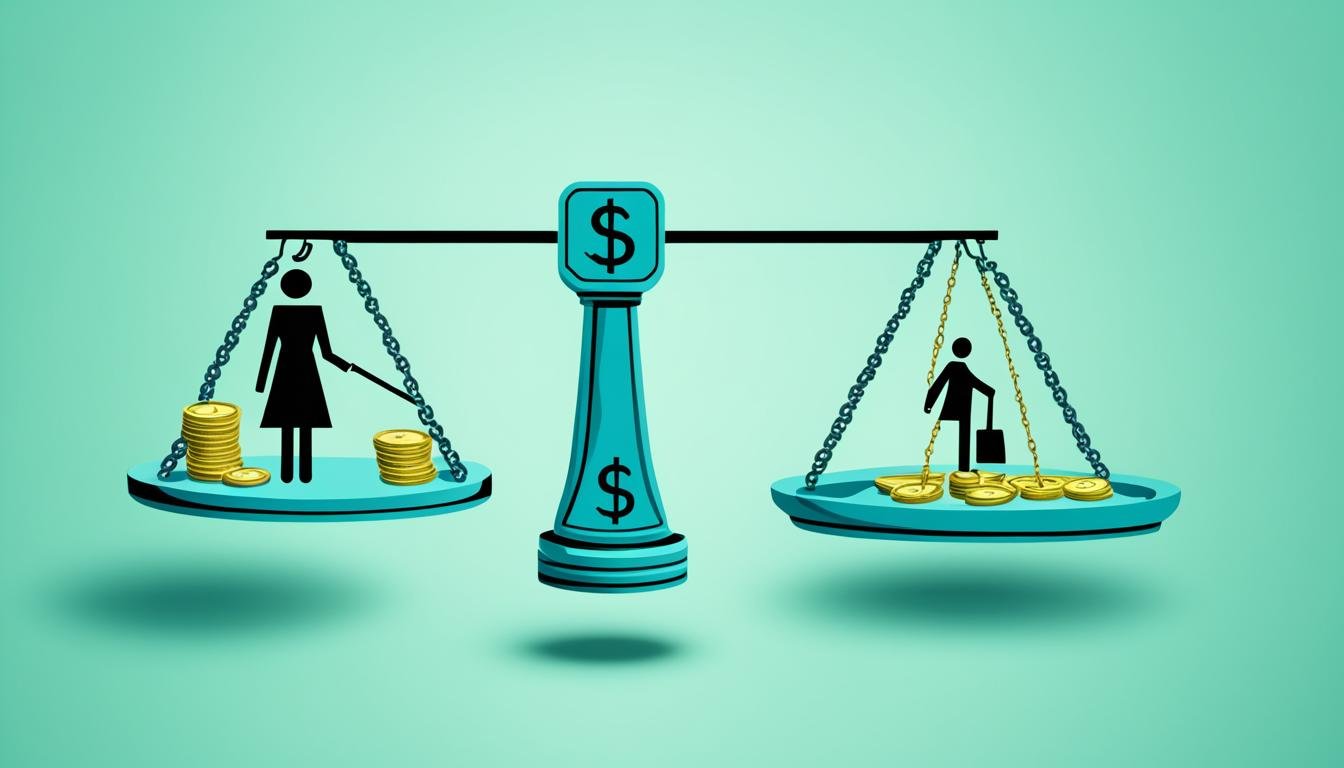How can companies in Ireland address the gender pay gap?
To tackle the gender pay gap issue, Irish companies face a complex challenge. The Gender Pay Gap Information Act 2021 now compels them to measure and address this gap. They’re required to report and work on reducing differences in what men and women are paid.
This means companies in Ireland must put in place plans that promote fairness. These plans should also aim to make the workplace more inclusive. Achieving equal pay is not just a good idea; it is the law.
If a company in Ireland has 250 or more workers, reporting on the gender pay gap is now mandatory. They need to share details for 2022 and 2023. Starting from 2024, this rule will apply to businesses with 150 employees, and by 2025, those with only 50 workers. They must show differences in pay, bonuses, and benefits between men and women.
Company bosses have a strict schedule to follow. They must pick a ‘snapshot’ date in June and then report by December. Following these steps ensures they meet the legal requirements promptly.
Gearing up for gender pay gap reporting is not just about the law. It significantly impacts how a company is seen, how its employees feel about it, and its ability to attract top talent. The current gender pay gap in Ireland is 14.4%, making it clear that being transparent in reporting is essential.
Companies can get help from places like KPMG Law to understand the process better. These resources can make reporting simpler. They can also help companies create workplaces that are truly equal and fair for everyone.
Understanding the Gender Pay Gap
The gender pay gap is the difference in average pay between men and women. It’s vital to grasp the gender pay gap understanding. It shows the big impact it has on our society and economy.
Definition and Implications
Two key terms help measure the gender pay gap: mean and median differences in hourly wages. The mean gender pay gap is the average wage difference between men and women. The median gender pay gap looks at the wage difference of the middle earners.
These terms are crucial in getting a true gender pay gap understanding. And they help in taking steps to address the issue.
The gender pay gap’s impacts reach far. It can affect workplace diversity and our economic health. A big gender pay gap can mean women effectively working for free part of the year.
In Ireland, women essentially work for free the last eight weeks because of a 14.4% gender pay gap. This shows a deep issue. It’s about more than just equal pay for the same job.
Current Statistics in Ireland
Recent findings on Ireland gender pay statistics highlight the need to act. Companies of a certain size must now share their pay gap details. This includes how bonuses and benefits are shared.
They also need to dig into their pay data. This helps find out why the gap exists. They look at different factors like age, location, and job roles.
Companies like ADI Ireland have set goals to improve. They aim to have more women in management and engineering. They hope to achieve almost equal pay between men and women globally by 2023.
This focus on transparency and change aims to make workplaces fairer. It promotes pay equity and workplace diversity in every part of the company.
The Gender Pay Gap Information Act 2021
The Gender Pay Gap Information Act 2021 is a big step in fighting wage inequality in Ireland. It makes employers share info on gender pay gaps. This includes average hourly pay for men and women, bonus differences, and how workers are spread across different pay levels.
Organizations must be clear about their gender pay gap. They also have to explain any differences and talk about how they’re fixing it.
Legal compliance means these reports must be out every year. The goal is to share Irish gender pay gap reporting with everyone. Small businesses with under 50 employees are excused. Those with 150 to 250 employees have extra time to get fully on board.
This law also sets the rules for who and what info must be shared. It tells how to calculate and publish pay gap data. So, every important group, like schools and government, has to follow the same rules.
Not sticking to the Gender Pay Gap Information Act 2021 has serious consequences. These go from hurting a company’s image to legal trouble. The Act supports using outside help to make sure reports are right. It’s a strong move to make sure men and women earn the same at work in Ireland.
Importance of Pay Equity
Pay equity is crucial for making a workplace fair and inclusive. It boosts morale and helps companies be seen as strong and caring employers. In Ireland, fair pay is a must and a smart move.
Impact on Employee Morale
Equal pay boosts how workers feel about their job. It shows they are valued equally. In Ireland, it creates a happy and productive place to work.
When people feel their work is fairly paid, they stay motivated. If pay isn’t fair, workers might feel down. This can hurt how much they work and how long they stay.
Effect on Employer Branding
Good pay practices make employers look ethical and modern. This makes top talent want to join them. But if pay isn’t equal, the company’s image can suffer.
In today’s world, how a company is seen is key. Making sure everyone is paid fairly helps. It builds a good name that keeps both employees and new prospects happy.
Focusing on fair pay in Ireland can make a big difference. It lifts spirits and makes brands stronger. It’s a must for companies looking to the future.
Conducting Pay Audits
For employers in Ireland, pay audits are key. They help deal with pay differences and ensure fairness in payment. These audits look closely at data to see if there are differences in pay between men and women. The goal is to have fair pay for all in the workplace.
Steps to Perform a Pay Audit
First, set a snapshot date. This date marks when you’ll collect your data. Then, gather all pay information such as hourly wages and bonuses.
Moving on, check the data for any issues like different pay for men and women. Look at the organization’s structure to see if there are any pay fairness problems. Doing this will help in understanding how pay is distributed and if everyone is being paid fairly.
Addressing Discrepancies
Dealing with pay differences means figuring out why they happen. Employers need to talk openly with the staff about what’s found and what they plan to do. Solutions might involve changing pay policies, improving how new staff are recruited, and advancing efforts for a more diverse and inclusive workplace. Acting early to fix pay problems helps make the workplace fairer for everyone.
Implementing Pay Transparency
Embracing pay transparency is crucial in fighting the gender pay gap. It involves using fair compensation strategies and talking openly about pay. When this happens, it stops unfair pay practices.
In Ireland, companies must set clear pathways for pay. They should base pay decisions on fairness and merit. This is a big step towards closing the pay gap.
Trusaic’s GDPR solution helps companies follow pay transparency laws worldwide. It makes managing pay data easier and ensures the data is correct. This avoids legal problems by spotting and fixing pay gaps.
With this tool, companies can change pay to make it fairer. This means they can show they’re getting better each year at closing pay gaps. Trusaic’s tool also helps companies talk well with their employees about pay issues and fixes.
Trusaic also offers the Salary Range Finder. This tool sets up fair and competitive pay rates within the law. It uses market data to make sure new hires get fair pay right from the start.
The Pay Transparency Directive says big employers must report on pay gaps regularly.
In Ireland, only big companies must currently share gender pay gap data. But by 2025, smaller companies must also report annually. A big part of the reporting is making sure jobs are compared fairly. It checks that equal work gets equal pay.
Pay transparency does more than meet the law. It builds a company culture of honesty and fairness. Companies must track and explain pay gaps and review their reward systems. This process helps everyone work towards more open and fair pay practices.
Diversity and Inclusion Initiatives
Diversity projects are key in closing gender pay gaps and making a more welcoming work culture. They use things like special recruiting, mentoring, and leadership programs for those not well represented. They help remove blockages and offer fair chances to everyone. These gender equality policies fit well with big business aims, making workplaces more exciting and varied.
Putting gender equality rules with your diversity work not only builds a more open work culture but sets up your company for future wins. By setting clear rules that back diversity, companies can greatly lessen pay differences and make sure fairness at all levels.
Highlighting diversity and inclusion shows we’re moving with society and can push companies forward. Addressing the wage gap through structured diversity initiatives is more than just following rules. It’s a smart step to improve your company’s atmosphere and success. With strong gender equality practices, these projects form a place where everyone can grow, making workplaces much better for everyone.
How can companies in Ireland address the gender abs pay gap?
To close the gender pay gap, Irish companies need to explore known solutions and learn from real-life examples. By combining these methods, they can make a real difference. This involves creating fairer pay for all.
Best Practices
A major step is to check salaries thoroughly with gender pay gap audits. These audits look at the average and middle hourly pay of everyone, from part-time to full-time staff, to find any unfair differences. It’s key to then share this info openly. Companies should report their findings online, explaining any pay gaps and steps they’re taking. Keeping up with this information is crucial to show they’re making real efforts.
Building teamwork across different parts of the company is also vital. HR, finance, and operations should work together. This helps them spot and fix any unfair pay. Such cooperation can make a workplace more welcoming for all. And it ensures everyone works together towards closing the pay gap.
Case Studies and Examples
Looking at specific examples offers insight. Take Accenture in Ireland. They improved by closely checking on their pay gaps and making their salary systems fairer. They also started recruiting in a way that’s more inclusive. This shows that ongoing work is essential. These successful strategies in Ireland prove that dedication pays off over time.
In finance, which often has bigger pay gaps, some companies are doing better. They’re actively looking for a more diverse workforce and helping women through mentorship programs. So, they’re seeing improvements in equal pay. These success stories stress the importance of keeping track and making changes to reach fairness in pay. Learning from these experiences can help Irish firms do better and close the gap.
Recruitment and Talent Development
Finding the right people and helping them grow is key in creating a fair and open workplace. Such efforts help focus on skills, not gender, leading to a fair hiring practice. This makes sure everyone gets a chance.
Ensuring Fair Hiring Practices
Using fair methods in hiring is crucial for equal opportunities. It means clearly describing the job, using fair measures in interviews, and involving many people in hiring choices. This can reduce our hidden biases and welcome talent from all over.
Equal Opportunities in Career Advancement
Advancing folks’ careers equally is vital for developing our talent. It includes clear standards for promotion and offering help, like mentors and training. In Ireland, the aim is to create a culture that lets everyone grow, regardless of gender.
Companies also need to keep their eye on how they give promotions and support growth. By checking and fixing issues that arise, we can cut down on pay and role inequalities. This effort leads to a workplace where everyone truly belongs.
Training and Awareness Programs
Training and awareness programs are key to fighting the gender pay gap. They help make workplaces more inclusive and fair for everyone.
Unconscious Bias Training
Unconscious bias training is a must. It teaches people to spot and stop hidden prejudices that affect pay and promotions. Making these biases visible leads to fairer workplace actions.
Workshops and Seminars
Workshops and seminars spark important discussions on gender pay gaps. These awareness programs dive into the issue, giving tips and knowledge to fight for fairness.
Regular diversity workshops show a company’s commitment to change. They help all employees understand and support fairness, which fights the pay gap.
Legal Compliance and Reporting
Navigating the terrain of legal compliance reporting is key in tackling the gender pay gap in Ireland. The Gender Pay Gap Information Act 2021 makes it a must for employers to share gender pay metrics publicly. Employers must follow through on their gender pay gap reporting obligations. This ensures that data is shared accurately and on time.
Reporting Obligations
In Ireland, companies with 250 or more staff need to report their gender pay gaps from 2022 and 2023. This rule will extend to companies with 150 workers or more by 2024, and to those with 50 workers or more by 2025. They have to share data on hourly pay gaps, bonuses, and pay for part-time and temp staff.
This data needs to include the share of male and female workers who get bonuses or extra benefits. It should also show pay differences across different job levels. Companies have to say why they find these pay gaps and show how they plan to fix them. The info should be on their websites for three years. It will also have to be in an online reporting system from 2023. They can pick any day in June to gather this data, with six months to do the math before the reporting date.
Consequences of Non-Compliance
Not following the rules can lead to big problems. Although companies aren’t fined for not doing this, they can face legal or reputational issues. The Irish Human Rights and Equality Commission might force compliance. If a company doesn’t report, its employees can complain. This could affect deals with other businesses or the company’s reputation. It points to the need to respect these laws and truly work to solve pay gaps.
Benefits of Closing the Gender Pay Gap
Closing the gender pay gap means more than just following the law. It brings lots of good things for a company in the long run. These include keeping workers happy, making space for new ideas, and more.
Enhanced Employee Retention
Closing the gap helps keep employees from leaving their jobs. It shows people they matter when they’re paid fairly. This makes workers feel valued and more likely to stay. For instance, at Irish Life, they help women move up in their careers. This makes women and top talent want to stay.
Improved Workplace Environment
A fair pay system also makes the workplace better. It builds an atmosphere of trust and fairness. At Irish Life, they help with IVF and maternity leave. This makes jobs more satisfying and shows the company cares for its employees.
Efforts like the Women in Finance Charter in Ireland aim for a fairer finance sector. Such steps make everyone feel important. This lifts spirits and makes work better for all.
In Ireland, as companies get fairer, they get more diverse talent. They also look better to workers, buyers, and investors. This all helps build a strong, innovative, and fair business scene in Ireland.
Monitoring and Continuous Improvement

Achieving gender pay parity needs careful work and a vow to always get better. It’s key to keep checking on these efforts and always look for ways to improve. Looking at the data on the pay gap often helps companies see what’s working and what needs to change.
In Ireland, the pay gap between men and women shows a complex picture. For instance, in 2014, men earned 13.9% more in yearly average wages than women. This gap jumped to 22.8% for monthly wages. In older age groups, men can earn 34% more than women. Despite these numbers, we must keep striving to close the gap.
Having a mindset of constant improvement means checking the data regularly and adjusting our actions. With new laws coming in 2025, we see the need to be always proactive. This keeps our efforts aligned with laws but also shows our real commitment to fairness.
Staying alert and always tweaking our efforts is crucial. This ongoing work is very dynamic. It needs companies to keep an eye on what’s happening and make changes as needed. Steadily working on this will help create a workplace that’s fair for everyone.
Conclusion
Closing the gender pay gap is a big, but very important, task for companies in Ireland. It requires following laws, checking wages fairly, and being open about pay. Ireland is doing better than the EU average, with its pay gap at 13.9%. Yet, work still needs to be done.
Even though more women graduate from college than men, they still face obstacles at work. This is where Irish companies need to step up, to encourage fairness. They can do this by checking wage differences using tools like Australia does. Also, good and affordable childcare is key to helping more women work.
To create better policies, we need to think about everyone who works, not just some people. As more different kinds of people work together in Ireland, we can see positive change. Companies become more successful when they mix different ideas and backgrounds. This leads to happier employees and better business results, overall.








